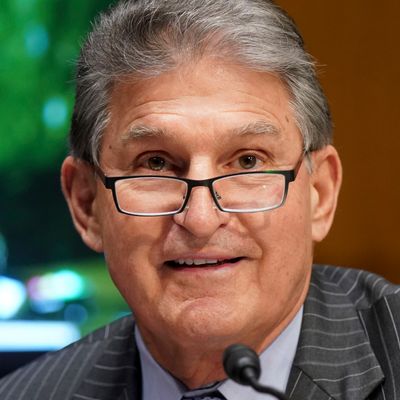
Joe Manchin is an odd Democrat.
This is true in a banal sense, in that the West Virginia senator is far more conservative than the median member of his party on a whole host of issues. At present, Manchin is directly blocking the passage of progressive gun safety, voting rights, and minimum wage bills, and indirectly obstructing just about every other item on President Biden’s agenda, by opposing substantial reforms to the legislative filibuster.
But on infrastructure, Manchin is a different kind of strange. Whenever the subject comes up, the man’s mood grows lighter, his eyes grow wider, and a wee bit of socialism creeps into his heart. Manchin has a keen appreciation for how important the New Deal’s public-works projects were to his region’s development, and how much his constituents stand to benefit from federal investment in rural broadband, roads, and bridges. For months now, he’s been touting his interest in a “$4 trillion” infrastructure bill — a figure markedly higher than any Biden floated on the campaign trail or since. In an interview with the Bipartisan Policy Center in February, Manchin likened the scale of his desired infrastructure package to that of the New Deal or Dwight Eisenhower’s federal highway bill.
At the time, it was unclear how seriously to take Manchin’s pronouncements; in the very same interview, the senator expressed reservations about the American Rescue Plan’s $1.9 trillion price tag. Meanwhile, Manchin was insisting that Democrats take a bipartisan approach to the infrastructure package. And yet, he was also insisting that the multitrillion-dollar bill be “paid for” with large tax hikes on corporations and the wealthy, a requirement that would render bipartisanship impossible.
But in remarks to NBC News Wednesday, Manchin signaled that the passage of a $1.9 trillion stimulus has not exhausted his appetite for a giant infrastructure package (as that great sage Larry Summers had predicted), and that he would rather the infrastructure bill be chock-full of taxes than for it to be bipartisan:
Sen. Joe Manchin said Wednesday that he favors a large infrastructure package that would be paid for in part by raising tax revenues — a point of contention between the two parties.
“I’m sure of one thing: It’s going to be enormous,” the West Virginia Democrat, who is seen as a swing vote in a chamber divided 50-50, told reporters at the Capitol.
… Notably, Manchin said the Republican resistance to higher taxes was not a “reasonable” position in an infrastructure negotiation.
“Where do they think it’s going to come from?” he asked. “How are you going to fix America?”
If Manchin’s true to his word, he will actually force the White House to take a more partisan (and, potentially, progressive) approach to its next legislative priority.
Earlier this week, the administration leaked word of its impending, roughly $3 trillion infrastructure plan, which would include investments in both America’s literal infrastructure (e.g., roads, bridges, carbon-emissions-reducing technologies) and its more figurative, “human capital” infrastructure (e.g., universal prekindergarten, free community college, a permanent child allowance). But as of two days ago, the administration was planning on breaking these two halves of its vision into separate bills, with the more traditional infrastructure bits going first, and the education and welfare spending coming second. Democrats can only use budget reconciliation once more this year, so a “multiple bill” strategy would presumably involve crafting a proposal on physical infrastructure that ten Republicans would be willing to support. The Wall Street Journal spelled out the implications of such an approach Monday, writing, “Some Democrats are pushing for the administration to reach a bipartisan agreement on infrastructure spending focused on roads, bridges, transit systems and more. That could mean later considering major tax measures through reconciliation, given the low chances Republicans would sign on to big tax increases.”
Thus, if Manchin values “paying for” infrastructure more than he does bipartisanship, he could actually force the White House to roll its remaining spending priorities into one giant reconciliation bill, which Republicans would have no influence over. That could both expedite the passage of a bill permanently extending the American Rescue Plan’s child allowance, while also pushing the details of the physical infrastructure package in a more progressive direction.
Of course, one should not necessarily take Manchin at his word. It remains unclear whether he is aware that he cannot convince his Republican friends that tax hikes are actually good. And if he does end up steering Biden toward a single big bill, once that is accomplished, he will surely exert a moderating influence on its substance, especially with regard to its climate provisions.
Nevertheless, Manchin’s remarks suggest that the American Rescue Plan will indeed be a mere down payment on Biden’s broader agenda for durably remaking the U.S. economy — or so the White House seems to think.






























